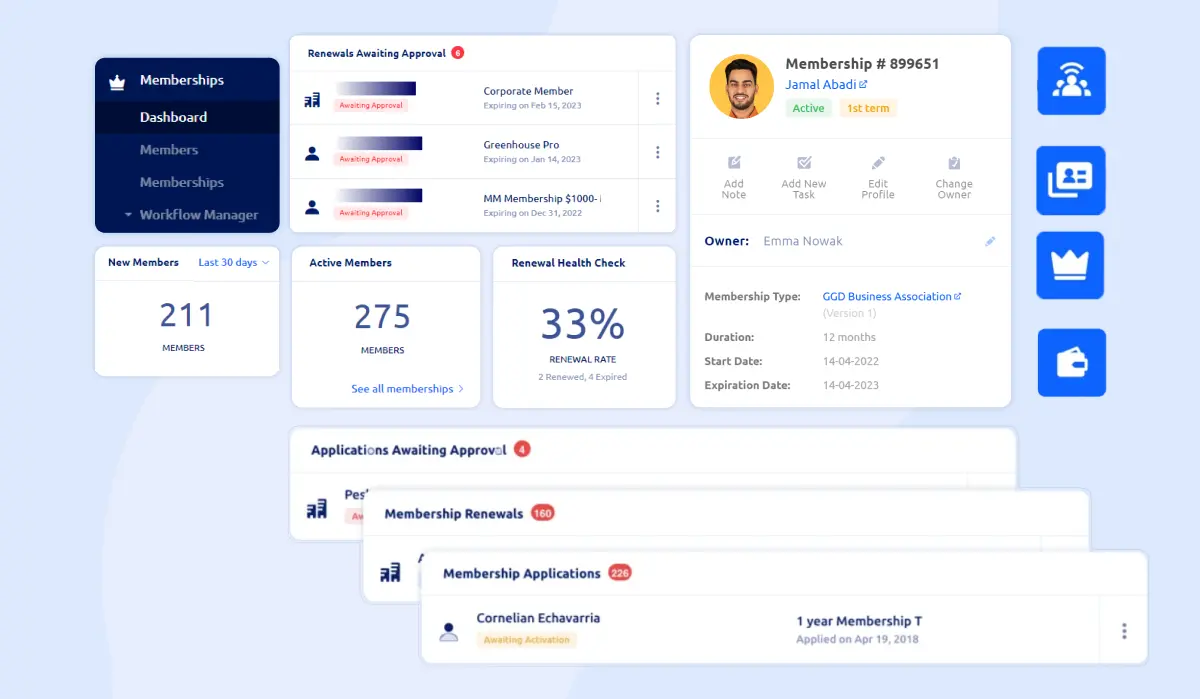
Associations have been around for a long time, bringing together people who share similar interests or goals. They're like clubs where folks join to connect, learn, or work on things together.
These associations cover all sorts of topics and areas, so if you can't find one that fits what you're looking for, you might consider starting your own. But starting one isn't that simple. It involves lots of rules, paperwork, and patience.
Explore insights into membership associations in this blog. Continue reading to discover more!
Key Takeaways
- Membership associations serve as platforms for individuals with shared interests to connect, collaborate, and support each other.
- Effective membership management is essential for the success of associations. It involves streamlining processes, engaging members, and providing valuable benefits and opportunities for participation.
- Member retention, attracting new members, maintaining relevance, and communication and engagement are common challenges faced by membership associations.
- Launching an association involves defining purpose, identifying a target audience, developing a membership structure, addressing legal and governance matters, financial planning, marketing, and promotion, and finally, launching and growing the association.
- Glue Up offers comprehensive association management software with features like membership management, event management, CRM, email campaigns, invoicing & payments, community building, and mobile apps. It streamlines processes, enhances communication, and empowers associations to thrive in today's dynamic landscape.
What Is a Membership Association?

A membership association serves as a platform for individuals who share common passions or pursuits to come together and unite under a common cause or interest. It provides a sense of community and belonging for its members, allowing them to connect with like-minded individuals who understand and appreciate their interests.
Through participation in the association's activities, members can not only socialize and network with others who share their passions but also collaborate on projects, share knowledge and expertise, and support each other's endeavors.
Additionally, membership associations often organize events, workshops, and seminars related to their shared interests, providing valuable opportunities for learning, growth, and enrichment.
In essence, membership associations play a vital role in fostering a sense of belonging and camaraderie among individuals with similar interests, ultimately enriching their lives and enhancing their personal and professional networking.
How Memberships Work for Associations

Membership functions as the lifeblood of an association, providing the energy and momentum necessary to keep it thriving. It operates as a complete cycle, with membership serving as its central component. Here's how it works:
- Revenue Generation: Memberships bring in the revenue needed to sustain the association's operations and initiatives.
- Member Benefits: In response to membership support, the association provides its members with perks and member benefits , such as exclusive access to resources, events, and discounts.
- Engagement and Support: Members actively engage with the association, participating in activities, contributing ideas, and supporting its mission and objectives.
- Continuous Improvement: The association gathers member feedback and involvement to continually improve its offerings, ensuring that they remain relevant and valuable to its members.
- Community Building: Through membership, individuals with shared interests come together to form a supportive community, fostering connections, collaboration, and camaraderie.
This reciprocal relationship between membership and the association marks a continuous flow of support and engagement, driving the organization forward and fulfilling its members' needs and expectations.
What Are the Benefits of Launching an Association Membership Program?
Launching a membership association indeed comes with numerous perks. Among its notable benefits are:
1. Reliable Revenue Through Membership Fees
Membership associations offer a significant advantage in terms of generating consistent and reliable revenue. Statistics show that the top reason people want to start a membership site is to establish a stable, recurring revenue stream.
When you run an association, you gain clarity regarding your organization's incoming revenue via membership dues and fees, enabling you to plan your finances effectively and allocate resources efficiently.
However, this financial stability serves as a solid foundation for long-term sustainability and growth. Notably, recent statistics indicate that 63.5% of membership businesses have experienced an increase in income over the past year.
Therefore, by prioritizing a stellar member experience and delivering value, you can anticipate a steady and progressive revenue trajectory over time.
2. Creating a Community Around Your Organization
Another notable benefit of establishing a membership association is the opportunity to cultivate a thriving community. You bring individuals together with similar interests or objectives from a particular area or region and create a network of like-minded individuals eager to connect, collaborate, and learn from one another.
Moreover, the community enriches the association and serves as a valuable asset for its members and society at large. Through shared knowledge, resources, and support, the community fosters growth, innovation, and collective progress.
3. Partnership Opportunities
When your association has members, it gains visibility and presents an opportunity for sponsorships and businesses to invest in your cause. Therefore, this investment ensures that the brand or service receives visibility and leads to potential deals. This is another useful benefit of membership associations.
4. Opportunity to Expand Your Reach
Having an association allows you to have a voice that carries weight. You get to address hundreds and thousands of members, which significantly increases your reach and amplifies your message. This extended reach is a significant benefit of having an association.
How Are Membership Associations Managed?

Managing an association can be smooth and easy if you follow these steps:
Association Chapters
If managing your association is going smoothly, that's great! However, as soon as it begins to grow, consider branching out into chapters. Chapters are like branches of your main association, especially useful if you're based in a city.
Expanding into chapters allows you to divide the workload and cater to different geographical areas or specific interests within your organization.
Roles and Responsibilities
Another effective strategy for managing your association is to clearly define roles and responsibilities. Assign specific tasks such as association dues collection, finance management, logistics, operations, security, and legal matters to designated individuals or teams, including members of the board of directors.
For example, you could appoint a treasurer from the board to handle finance management, a logistics coordinator, and a legal advisor for legal matters.
The distribution of responsibilities accordingly helps you lighten your burden and ensure that each aspect of your association is efficiently handled.
Membership Structures
Another effective approach to association management is to organize memberships into distinct categories. Based on their specific needs and requirements, this can include individual members, local members, or organizational members.
The categorization of members in this way allows you to tailor your services and communication strategies to better meet their needs. However, this not only streamlines your administrative tasks but also allows you to focus on the collective goal of achieving excellence within your association.
Membership Dues and Fees
Membership dues and fees provide essential financial stability for associations, ensuring smooth operations, resource allocation, and investment in growth opportunities. The dues also foster member engagement and contribute to your association's long-term sustainability.
Common Challenges Facing Membership Associations

Let's discuss some of the common challenges faced by member associations.
Member Retention
The biggest issue associations may be facing is member retention. Retaining existing members has been a challenge for associations, and it's essential to address this.
Member retention is crucial for associations because onboarding new members every time can be costly, and retained members tend to contribute more financially.
According to Forbes, businesses have a 60 to 70% chance of selling to an existing customer, while the probability of selling to a new prospect is only 5% to 20%.
Attracting New Members
Attracting new members is also a challenge in itself, requiring a lot of work and resources. Associations often invest significant funds in acquiring new members, yet achieving a good return on investment (ROI) remains difficult.
Organizations run membership drives, marketing campaigns, social media ads, influencer marketing, and other measures to attract new members, making it a significant challenge.
Relevance and Member Benefits
When you own an association, it's essential to stay relevant to your members and provide them with benefits that are worth their fees or slightly more. However, maintaining this balance is one of the most common issues faced by associations.
Communication and Engagement
Maintaining the same level of communication among members becomes increasingly challenging as the association grows. Similarly, engagement also becomes more difficult to sustain. Despite measures taken and events organized, it remains a task that requires consistent oversight.
Launching a Membership Association: Your 7-Step Guide

Now that you have a thorough understanding of membership associations, you may be eager to launch your own. However, you might be concerned about how to begin and where to start. Don't worry, we're here to help. Explore our 7-step guide on how to start an association and let's begin this journey together!
1. Define Your Purpose
The first and foremost step in launching an association is to define your purpose. You need to thoroughly articulate why you want to launch it and what unique value you'll provide to members that they're not already receiving. If there are already associations in the sector, you must justify why another is necessary.
Answering these questions and being clear about your intentions are necessary. Here are the key points you need to state:
- Clearly define the purpose of your association.
- Explain the unique value proposition for members.
- Justify the need for another association in the sector.
- Articulate your intentions and goals clearly.
How To Write A Nonprofit Mission Statement in 7 Steps (Plus 10 Great Examples)
Writing a mission statement for your non-profit is crucial as it defines your core values and purpose, communicating to the world what you're here to do and the direction you aim to go. Crafting a clear mission statement can be achieved in seven steps:
- Gather Your Team and Brainstorm
- Identify Your "Why"
- Analyze Your Work
- Craft a Clear and Concise Statement
- Consider Adding Inspiration
- Ensure Measurable Impact
- Get Feedback and Revise
10 Examples of How to Write a Mission Statement
Here we present a list of 10 great examples to inspire you in crafting a mission statement. Let's begin:
1. Lutheran Services in America
The first on our list is Lutheran Services in America. This nonprofit organization operates on the principle of Lutheran theology, emphasizing the importance of caring for our neighbors. Inspired by the spirit of early Lutheran reformers, they strive to address society's greatest challenges.
2. Samaritan's Purse
Samaritan's Purse is based on the Good Samaritan story "Go and do likewise." With a mission of relief and evangelism worldwide, they embody the spirit of compassion and service seen in the biblical narrative.
3. MAP International
MAP International provides a strong example of a well-crafted mission statement. The organization, dedicated to global health, clearly articulates its origins, motivations, and impact.
4. Step Up For Students
Step Up For Students is another exemplary organization with a well-articulated mission statement. As an educational nonprofit, it effectively communicates its cause, mission, and overall impact.
5. UNICEF USA
UNICEF USA stands out for its clear and concise mission statement, demonstrating how to effectively deliver the intended message.
6. Americares Foundation
Americares Foundation serves as an excellent example of a well-defined mission statement, particularly in the health sector. Their clear explanation of their actions and methods serves as valuable inspiration for others.
7. United Way
The seventh example on our list, United Way, serves as a remarkable source of inspiration. With its extensive work in healthcare and education, the organization exemplifies a commitment to community well-being.
8. Feed My Hungry Children
Feed My Hungry Children is a charitable organization dedicated to combating hunger and malnutrition, particularly among children. The organization's clear mission is to alleviate hunger and improve the lives of vulnerable communities; it serves as a beacon of hope and compassion for those facing food insecurity.
9. YMCA
YMCA, or Young Men's Christian Association, is a worldwide organization committed to strengthening communities through youth development, healthy living, and social responsibility. What sets the YMCA apart is its clearly defined mission, which is evident in every aspect of its work.
10. American Heart Association
The American Heart Association's mission statement, "To be a relentless force for a world of longer, healthier lives," is a model of clarity and purpose. It succinctly communicates the organization's commitment to fighting cardiovascular diseases and inspires action toward achieving its vision of a healthier future for all.
Step 2: Identify Your Target Audience
Once you've defined your purpose, the next step is to identify your target audience. If there's a majority, determine which industry most of your members belong to and then take measures accordingly, considering their needs. This certifies that your mission resonates with your audience and aligns with their interests and needs.
Step 3: Develop a Membership Structure
Creating a membership structure is an important step in ensuring the effectiveness and sustainability of your association. Take the time to carefully consider the needs and preferences of your potential members and your organization's goals and objectives.
You can opt for tiered memberships or a unified approach and tailor your structure to boost member engagement and satisfaction while also supporting the overall mission and vision of your association.
Designing the Best Membership Program for Nonprofits
Designing the best possible membership structure for any nonprofit requires careful consideration of several factors. Firstly, determine the primary purpose of your membership program: Is it solely for fundraising through donations, or will you also offer exclusive benefits to members?
Next, consider your target audience's demographics and financial capabilities. Assess how much they can afford to pay for membership dues.
Once you have a clear understanding of your audience, evaluate the benefits you can offer them in return for their membership. Do you have exclusive perks or services that only a select group of members should access? If so, consider implementing a tiered membership structure to accommodate different levels of engagement and contribution.
For example, let's say your nonprofit offers educational workshops, with basic access available to all members but more personalized coaching sessions reserved for premium members. In this case, you could establish different membership tiers based on the level of access to these workshops.
Overall, designing a membership structure requires thorough consideration and brainstorming to ensure it aligns with your organization's goals and effectively meets your members' needs. However, the right approach and strategy can lead you to create a membership program that will boost engagement and support your nonprofit's mission.
Step 4: Legal and Governance Matters
Now that you've clarified your purpose and identified your target audience, it's time to move on to the practical steps of launching your association. One crucial aspect is ensuring that your association is legally established. To do this, it's essential to consult with legal experts or law enforcement authorities to verify that you're proceeding legally.
However, this involves ensuring that you have all the necessary documentation and that you meet all the criteria set forth by the relevant regulations. Also, you abide by the rules and regulations and validate that your association is legally recognized and operates within the bounds of the law.
Step 5: Financial Planning
This step is of great importance because everything ultimately depends on it. You need to concisely plan your finances and develop a strategy to manage them effectively. Design a comprehensive financial plan detailing where the revenue will come from, how it will be generated, and where it will be allocated.
Classify the budget into different categories, such as operating expenses, marketing costs, and member benefits. Assess whether you're operating at a loss or a profit and adjust your strategy accordingly.
Overall this financial planning process is crucial for the sustainability and success of your association.
Membership Form Best Practices for Enrollment and Renewals
incorporate all the essential details in your membership form, including membership pricing, benefits, membership tenure, terms and conditions, violations, and refund policy. Also, by providing comprehensive information and adhering to this practice, you make everything clear for your members and increase membership enrollment.
However, this transparency and clarity not only attract more members but also contribute to their satisfaction and long-term engagement with your association.
Step 6: Marketing and Promotion
When launching your association, it's important to consider how you will promote it to reach your target audience and what marketing channels you'll utilize. Creating a marketing plan and determining the means of promotion are crucial aspects to consider.
You may opt for traditional marketing methods, digital marketing channels, or a combination of both. Having a well-defined marketing plan and budget is essential. This confirms that you effectively reach your target audience, increase awareness about your association, and attract potential members.
Step 7: Launch and Grow
The final step in launching an association is to officially launch it and from the first day, have a vision for growth. Implement measures to achieve this vision by considering the benefits that will bind your members to the association and attract new prospects.
While offering value through support, deals, or discounts, focus on aspects that will facilitate your association's continuous growth.
Launch Your Association with Glue Up: A Comprehensive Approach

Once you have taken the necessary steps and launched your association, you will need association management software to get your organization running. Such software's helpful features make the operation easy and smooth.
One such software that can be your trusted companion in this regard is Glue Up, an efficient association management software that offers many features to support your journey.
For your better understanding, let's explore what Glue Up has to offer for organizations intending to streamline their workflow.
Membership Management
Glue Up's membership management tools are designed to streamline the entire membership process, making it effortless for association administrators. The flexibility of unlimited membership types lets you tailor membership categories to suit the diverse needs of your members.
The membership dashboard provides a centralized hub for managing member data, offering easy access to important information such as contact details, membership status, and engagement metrics.
Moreover, Glue Up's automation features eliminate the need for manual intervention in routine tasks like onboarding new members and processing membership renewals. Automating these repetitive tasks frees up your valuable time and resources to focus on strategic initiatives and association growth.
Event Management
Glue Up's event management tools assist you in planning, promoting, and executing a wide range of events catering to various formats and audiences. The platform provides you with the necessary resources to ensure the success of every event, be it webinars, workshops, seminars, or large-scale conferences.
The professional event templates offer a solid foundation for event planning, allowing you to quickly set up your event with pre-designed layouts and customizable elements. Additionally, the event invitations feature enables you to reach out to your target audience effectively, with options to personalize invitations and track responses seamlessly.
CRM
Glue Up's CRM tools empower you to build strong and meaningful relationships with your members by providing a comprehensive set of features designed to enhance member engagement and satisfaction.
You can easily track all interactions, preferences, and engagement levels and gain valuable insights into your members' needs and behaviors. The history feature of all interactions ensures that every interaction with your members is personalized and relevant.
Besides platform offers easy import functionality, enabling you to seamlessly import member data from various sources and consolidate it within the CRM system. Additionally, automatic synchronization ensures that your member data is always up-to-date, eliminating the need for manual data entry and minimizing the risk of errors.
Email Campaigns
Glue Up's email campaign features engage your members effectively. The platform empowers you to create and send personalized emails tailored to segmented audiences, driving member engagement and participation.
You can utilize an intuitive drag-and-drop email designer to craft visually appealing and impactful emails without any coding knowledge required.
The contact management system enables you to maintain a centralized database of contacts, ensuring that you have easy access to member information and preferences.
Invoicing & Payments
Glue Up's finance and invoicing module manages your organization's finances. The platform simplifies financial transactions, making it easy to handle invoicing, payment acceptance, and transaction tracking.
The platform automates various finance processes, enabling you to generate invoices automatically, deliver receipts, and boost revenue effortlessly.
Glue Up allows you to effortlessly manage invoices, deliver receipts to your clients or members, and accept payments in multiple currencies. However the platform supports a wide range of options be it clients prefer credit cards, bank transfers, or other online payment methods,
Community
Glue Up's community features cultivate a sense of belonging and collaboration among your members and foster meaningful connections and interactions. The platform offers various tools and functionalities designed to bring your community closer together and enhance engagement.
Moreover, the platform provides a tailor-made private social media platform designed to facilitate business networking, increase member retention, boost engagement, and safeguard your community's information. Also, the community features allow you to create a vibrant online space where members can connect, collaborate, and support each other.
Overall, Glue Up empowers associations to thrive in this competitive world by automating membership workflows, streamlining communication, and enhancing member experiences. It offers a range of benefits, from automated reminders to customizable dashboards.
Ready to experience the power of Glue Up for your association? Book a demo today to see how Glue Up can transform your association management journey.



